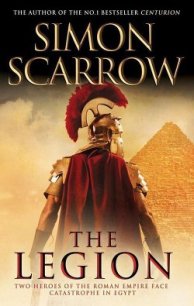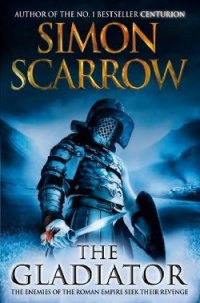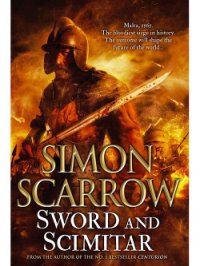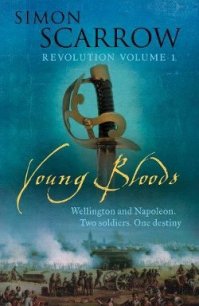Son of Spartacus - Scarrow Simon (книги онлайн полные версии .TXT) 📗
‘Taurus!’ Brixus called out through gritted teeth. ‘Over here! Now!’
The giant plucked one of the raiders aside and threw his weight against the door beside his leader. At once it began to move again, steadily closing until the gap was too narrow for anyone to pass through. The pale shaft of light cast from the lamps shrank and then vanished as the door closed on the frame.
‘Hold it shut,’ Brixus ordered and gestured to the nearest of his men to help Taurus, before he drew back and looked around the compound. A short distance away, beside one of the granaries, he saw a heavy cart. Summoning several men, he hurried across the compound and grasped the yoke. Straining against the dead weight of the vehicle, the raiders pulled it across to the barracks where the door shuddered under the impact of bodies and weapons from within. The cart was manoeuvred close to the wall and worked along the door, pinning itin place. The guards could only open it a small way, enough to let out a sliver of light.
‘What now?’ asked Taurus.
‘Take your men and get some dry feed from the stables, then pile it up round the barracks. The rest of you, cover the windows and don’t let any of them out.’
While the barracks was surrounded and bales of hay piled the walls, a handful of the guards guessed the fate that the raiders had in store for them and tried to escape through the small windows set high in the building. Seeing them, the raiders thrust their spears up, forcing the men back inside. Once Brixus was satisfied that preparations were complete, he ordered oil to be poured over the combustible materials and told Pindar to light a torch from the brazier above the gatehouse. When Pindar returned he handed the torch to Brixus, who limped up to the cart blocking the door.
‘You inside, hear me! Throw out your weapons and surrender.’
There was a brief pause before a voice answered. ‘And let ourselves be slaughtered like cattle? No chance. I’ll die like a man.’
‘Then die you will,’ Brixus shouted back. A cold smile flickered across his lips. ‘Let your deaths be a beacon to every Roman and slave alike. For liberty!’
He stepped forward and applied the torch to the straw piled up beneath the cart. The flame caught at once and spread through the dry lengths with a light crackle, then a growing roar, as the flames licked up and burned fiercely. They spread round the edge of the barracks and smoke billowed into the air, the lurid orange clouds lit up by the savage fire.
There were shouts from inside the barracks, and cries of panic as the men appeared at the windows, but were beaten back by the heat. The raiders stood in a loose circle about the burning building, dark figures silhouetted against the brilliant glare of the flames, their long shadows stretching behind them into the darkness. Before long the flames had caught the roof timbers, and sections of tile collapsed inside. There were no more shouts, just piercing shrieks of agony muffled by the occasional sharp reports of timbers bursting. The screams continued for a while and then there was only the roar of the fire.
Brixus climbed up on to the edge of the well and surveyed the small crowd before him, their faces lit up by the slowly dying fire of the barracks. To one side stood the steward who ran the estate for Ids wealthy master, with his wife and two sons barely I in their teens. They looked down at the ground, afraid to meet the eyes of their captors. Brixus turned his attention back to the crowd. Their expressions were mostly fearful, but some looked at him with hope in their eyes. They would be the to his side, Brixus reflected as he gathered his to address the slaves who had just been the long, low shed where they were shut in when not at work in the; fields and groves of the estate. As the locking bar had been withdrawn and the doors opened, the familiar stench of sweat and human waste billowed out from inside and he cursed the Romans for treating these people little better than animals.
Holding his torch aloft, Brixus had entered the building, fighting back his nausea as the slaves cowered away from him. Most of them were chained together by the ankle to prevent any attempt at escape when they were out in the fields. Only a handful — children and older men and women — had their irons removed. They wore little more than rags, soiled and torn, and their filthy skin was covered in bruises and scars from the beatings of their overseers.
‘I am Brixus,’ he announced. ‘A lieutenant of Spartacus. I have come to set you free.’
He turned to his followers. ‘Get the chains off them and lead them out of here. Keep ’em together so I can speak to them when they’re ready.’
Now the slaves stood before him, anxious to learn what would become of them.
Brixus drew a deep breath and spoke loudly to be heard over the distant crackle of the flames still consuming what was left of the barracks.
‘Your lives of back-breaking toil are over, my friends. There will be no more whips. No more chains. No more slowly starving on the thin gruel provided by your masters. See how well they lived while you endured so much suffering, exhaustion and hunger?’ He thrust his arm towards the steward and his family.
The slaves glanced towards the man who had controlled every aspect of their lives and there was silence before a voice muttered angrily. Others joined in, waving their fists.
Brixus raised his hands and called out to them. ‘Enough! Enough! You will have your revenge shortly. For now, listen to me.’
When they had fallen silent, he continued. ‘As I said. You are no longer slaves, but free. Now you may choose what to do with your lives. You are masters of your fate.'
‘What happens when news of this attack gets out?’ a voice asked. ‘They will come here and punish any slave they find.’
‘Then come with us,’ Brixus replied.
‘And go where? The Romans will hunt us down like dogs.’
‘No, they won’t. I told you my name. I am Brixus, loyal to what Spartacus died for. When the rebellion ended I survived, along with many others. When I escaped again I made for the hills and mountains of the Apennines and joined those of the slave army who still remained in hiding. Since then we have been adding to our number by raiding the estates of those who call themselves our masters, and setting their slaves free. I lead but one of the bands of rebels who hide in the mountains. The Romans have tried to hunt us down, but we have eluded them. Now we are fighting back, hunting them down in turn and destroying their patrols and burning their outposts to the ground. They are becoming afraid of us. Every Roman soldier we kill, every villa we destroy, every slave we set free adds to their fear.’ Brixus paused to give emphasis to his next words. ‘One day soon we will be strong enough to rekindle the rebellion that Spartacus once led and there will be a new war against those who would keep us as slaves.’
There were excited cries of approval from the crowd, then an old man at the front took a step forward.
‘I too fought for Spartacus. But we were an army. Tens of thousands of us. And the Romans still beat us. You are the leader of a band of runaways and brigands. What chance have we got if we join you? What freedom do you really offer? A few months as fugitives in the hills, in the depth of winter, before we are hunted down, caught and punished. Last time they crucified thousands in order to teach us a lesson. How much greater do you think their anger will be a second time?’ The old man turned to his comrades and raised a hand to draw their attention. ‘I say we’d be better off here. When the soldiers come, we’ll explain that we had no part in tonight’s action.'
‘You old fool!’ Brixus shouted him down. ‘Do you think they will listen to you? No. It will make no difference to their desire for revenge. They will make an example of you just the same. Stay here and you will die.’




